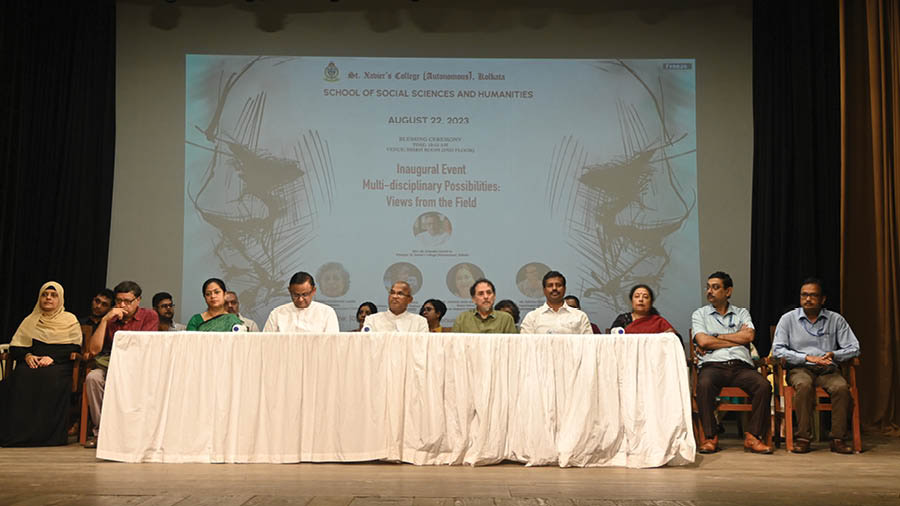Society does not exist, and cannot be understood, in silos. For critical thinking and creativity to effectively tackle societal issues, the horizons of learning must expand and the boundaries of knowledge must be porous. In an age of polycrisis, when the world is simultaneously in the grips of climate change, economic turmoil, political upheavals and more, only a multidisciplinary approach to education can enlighten minds and embolden measures.
It is precisely this philosophy that animates the School of Social Sciences & Humanities (SSS&H) inaugurated by St Xavier’s College (Autonomous), Kolkata on its Park Street campus on August 22. The aim is to “create and foster a holistic academic ecosystem”, with the School identifying common areas of interest across the departments of English, political science, sociology, Bengali, mass communication and videography to develop an orientation towards “multidisciplinary, interdisciplinary and transdisciplinary research among students and faculty members”.
With an emphasis on application-oriented workshops and seminars, the School will put skill enhancement courses, as outlined in the National Education Policy (NEP), to practise across departments. It will connect students with a network of stakeholders to facilitate internships as well as wider skill development. Research projects will also be conducted as part of the School to incentivise third-party collaborations and hands-on training for students.
‘The vision of this School aligns perfectly with the vision of the NEP to bridge disciplinary divides’
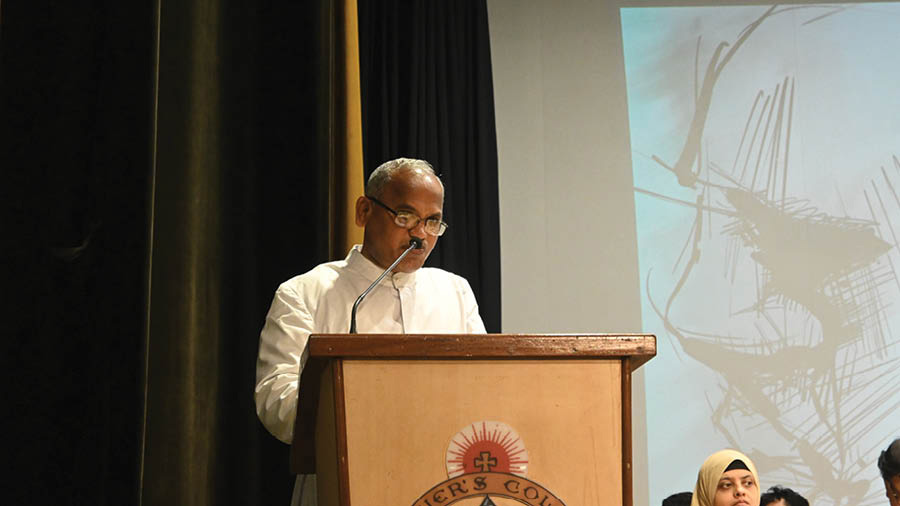
Rev Fr Jeyaraj Veluswamy, SJ, rector of St Xavier’s College, described the school as a “hub of transformation and inspiration”
Following a blessing ceremony, the inauguration programme for SSS&H got underway at the Fr Depelchin Auditorium at St. Xavier’s, with professor Arjun Sengupta essaying the role of the emcee. “This is the beginning of a new chapter of academic excellence at our institution, where this School will serve as a beacon of knowledge for young minds. As a hub of transformation and inspiration, it will help reaffirm our commitment to empathy and the understanding of the human experience. In an interconnected and interdependent world, this School will provide critical tools for societal analysis that will act as agents of positive change,” said Rev Fr Jeyaraj Veluswamy, SJ, rector of St. Xavier’s College.
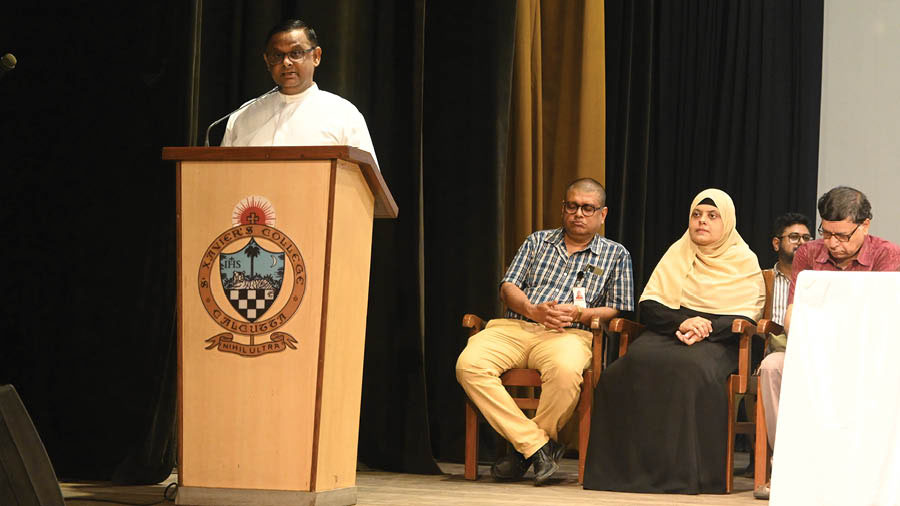
Rev Dr Dominic Savio, SJ, principal of St Xavier’s College and director of SSS&H observed how the “convergence of disciplines is the bedrock of intellectual exploration”
“This school will provide meaningful and practical experience to students and serve as a testament to holistic education and the remarkable power of collaboration. After all, the convergence of disciplines is the bedrock of intellectual exploration, since the most profound insights emerge at the intersection of different fields of knowledge. The vision for this School aligns perfectly with the vision of the NEP to bridge disciplinary divides,” said Rev Dr Dominic Savio, SJ, principal of St Xavier’s College and director of SSS&H.
Professors from across departments at St Xavier’s are part of the administration of SSS&H, with a key role being played by professor Bertram Da Silva, vice-principal of Arts and Science at St Xavier’s, under whose supervision the School has materialised into reality.
Short-term, medium-term and long-term goals
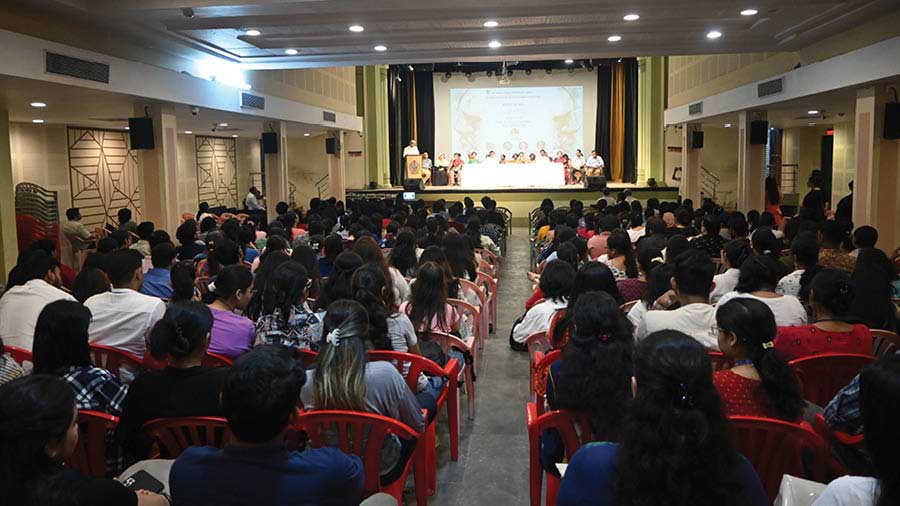
Students from the various Arts departments at St Xavier’s will automatically become a part of SSS&H
The goals of the School have been segregated into three timelines. As part of the short term, which looks at the rest of 2023, the plan is to organise workshops and seminars for students alongside faculty development programmes. Independent projects will also be taken up, premised on archiving, translation and digitisation, where the concentration will be on research methodology for students so that skill enhancement can be implemented.
The medium-term objectives, for 2024, include designing and offering a three-credit multidisciplinary paper, as suggested in the NEP curriculum besides conceptualising multidisciplinary MOOCs (Massive Open Online Courses).
The long-term targets, set for 2025, involve the creation of an interdisciplinary peer-reviewed journal and the development of a one-year specialised master’s in social sciences programme.
Encouraging a ‘dialectical relationship between humanities and social sciences’ and ‘transgressive approaches’
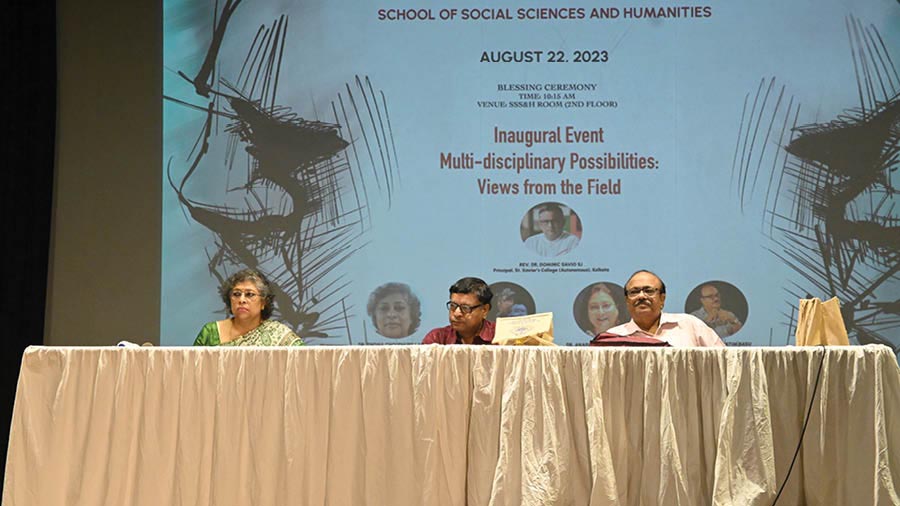
Dr Shoma Choudhury Lahiri, Dr Dipankar Sinha and Dr Partha Pratim Basu during the panel discussion
After the explanation of the School’s modus operandi, a panel discussion took place in the auditorium on “Multidisciplinary Possibilities: Views from the Field”, moderated by Dr Shoma Choudhury Lahiri, professor of sociology at St. Xavier’s College.
The first speaker for the session, Dipankar Sinha, professor of political science at Calcutta University, harped on how “monochromatic knowledge doesn’t give good returns to either humanities or social sciences”. Making a distinction between multidisciplinary learning, which he compared to a salad bowl, and interdisciplinary learning, which he made analogous to a pudding. Sinha called for a “dialectical relationship between humanities and social sciences, which had been separated in the 19th century and driven farther apart in the 20th, before coming closer in the hybridity of the 21st.”
Partha Pratim Basu, professor of international studies at Jadavpur University, was the second speaker for the session. He underlined how different disciplines can supplement each other by approaching the same issue from various vantage points. As an example, he spoke of his doctoral research on Indian foreign policy and the press. Taking three instances of major foreign policy events across the second half of the 20th century, Basu explained the relationship of the press with the Indian government as shaped by the kaleidoscopic nature of geopolitical conflicts: “During the 1962 Indo-China War, the Indian press was mostly sympathetic to the government until it started making costly strategic errors. During the 1971 clashes with Pakistan, which led to the birth of Bangladesh, the press was by and large in the corner of Indira Gandhi. But during the 1980s, when India was embroiled in an imbroglio in Sri Lanka, the press gradually became much more critical.”
A question-answer session wrapped up the programme, as part of which Prothoma Rai Chaudhuri, professor of political science at St Xavier’s, asked the panellists whether “multidisciplinarity can subvert or bypass disciplinary foundations by deliberately neglecting structural positions”. In response, the speakers reiterated that multidisciplinary learning does not mean the collapse of individual disciplines. Rather, it is about encouraging “transgressive approaches” that can strike the right balance between “the utilitarian and the esoteric” when it comes to the intertwined paradigms of teaching and learning.
